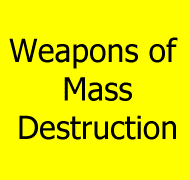




At the end of World War I, the victorious Allies decided to reaffirm in the Versailles Treaty (1919) the prewar prohibition of the use of poisonous gases and to forbid Germany to manufacture or import them. Similar provisions were included in the peace treaties with Austria, Bulgaria, and Hungary.
Drawing upon the language of these peace treaties, the United States -- at the Washington Disarmament Conference of 1922 -- took the initiative of introducing a similar provision into a treaty on submarines and noxious gases. The U.S. Senate gave its advice and consent to ratification of this treaty without a dissenting vote. It never entered into force, however, since French ratification was necessary, and France objected to the submarine provisions.
At the 1925 Geneva Conference for the Supervision of the International Traffic in Arms, the United States similarly took the initiative of seeking to prohibit the export of gases for use in war. At French suggestion it was decided to draw up a protocol on non-use of poisonous gases and at the suggestion of Poland the prohibition was extended to bacteriological weapons. Signed on June 17, 1925, the Geneva Protocol thus restated the prohibition previously laid down by the Versailles and Washington treaties and added a ban on bacteriological warfare.
Before World War II the protocol was ratified by many countries, including all the great powers except the United States and Japan. When they ratified or acceded to the protocol, some nations -- including the United Kingdom, France, and the USSR -- declared that it would cease to be binding on them if their enemies, or the allies of their enemies, failed to respect the prohibitions of the protocol. Although Italy was a party to the protocol, it used poison gas in the Ethiopian war. Nevertheless, the protocol was generally observed in World War II. Referring to reports that the Axis powers were considering the use of gas, President Roosevelt said on June 8, 1943:
Use of such weapons has been outlawed by the general opinion of civilized mankind.Although the Senate Foreign Relations Committee favorably reported the protocol in 1926, there was strong lobbying against it, and the Senate never voted on it. After the war, President Truman withdrew it from the Senate, together with other inactive older treaties. Little attention was paid to the protocol for several years thereafter. During the Korean war the Communist side accused the United States of using bacteriological weapons in Korea, but at the same time they rejected American proposals for international investigation of their charges. In the Security Council, the Soviet Union introduced a draft resolution calling on all U.N. members to ratify the protocol. At that time the United States was not willing to agree to prohibit the use of any weapons of mass destruction unless they could be eliminated through a disarmament agreement with effective safeguards. On June 26, 1952, the Soviet resolution was rejected by a vote of 1 to 0, with 10 abstentions (including the United States, the United Kingdom, and France).This country has not used them, and I hope that we never will be compelled to use them. I state categorically that we shall under no circumstances resort to the use of such weapons unless they are first used by our enemies.
In 1966 the Communist countries strongly criticized the United States for using tear gas and chemical herbicides in Vietnam. In the General Assembly, Hungary charged that the use in war of these agents was prohibited by the Geneva Protocol and other provisions of international law. The United States denied that the protocol applied to nontoxic gases or chemical herbicides. Joined by Canada, Italy, and the United Kingdom, the United States introduced amendments to a Hungarian resolution that would have made the use of any chemical and bacteriological weapons an international crime. In its final form the resolution called for "strict observance by all states of the principles and objectives" of the protocol, condemned "all actions contrary to those objectives," and invited all states to accede to the protocol. During the debate the U.S. Representa-tive stated that it would be up to each country to decide whether or how to adhere to the protocol, "in the light of constitutional and other consider-ations."
Interpretation of the protocol remained a thorny problem. In his foreword to a U.N. report on chemical and biological weapons (July 1, 1969), Secretary General Thant recommended a renewed appeal for accession to the protocol and a "clear affirmation" that it covered the use in war of all chemical and biological weapons, including tear gas and other harassing agents. Discussion in the Conference of the Committee on Disarmament (CCD) showed that most members agreed with the Thant recommendations. Swedish Ambassador Myrdal, a strong advocate of the broad interpretation, stressed the danger of escalation if nonlethal chemical agents were permitted. She also pointed out that the military use of tear gases should be distinguished from their use for riot control and that there was a similar difference between using herbicides in war and employing them for peaceful purposes. On the other hand, U.K. Disarmament Minister Mulley held that only the parties to the protocol were entitled to say what it meant.
In the General Assembly, the 12 nonaligned members of the CCD, joined by 9 other nations, introduced a resolution condemning as contrary to international law the use in international armed conflict of all chemical and biological agents. Opposing the resolution, the U.S. Representative reaffirmed the American interpretation of the protocol and took the position that it was inappropriate for the General Assembly to interpret treaties by means of a resolution. The 21-nation resolution was adopted on December 16, 1969, by a vote of 80 to 3 (Australia, Portugal, the United States), and 36 abstentions (including France and the United Kingdom). France and many other abstainers accepted the broad interpretation of the protocol but considered the resolution undesirable on other grounds.
While the General Assembly debate was still underway, President Nixon announced on November 25,1969, that he would resubmit the protocol to the Senate. He reaffirmed U.S. renunciation of the first use of lethal chemical weapons and extended this renunciation to incapacitating chemicals. It was on this occasion that he also announced the unilateral U.S. renunciation of bacteriological (biological) methods of warfare.
Some support for the American interpretation of the protocol now came from the United Kingdom and Japan. During the 1930 discussion at Geneva in the Preparatory Commission for the Disarmament Conference, the United Kingdom had taken the position that the protocol covered tear gas. In February 1970 the British Foreign Secretary told Parliament that this was still the British position, but that the riot-control agent CS, unlike older tear gases, was not harmful to man and was therefore not covered by the protocol. During the Diet debate on Japanese ratification of the protocol, Foreign Minister Aichi took the position that it did not prohibit riot-control agents and herbicides. Japan ratified the protocol in May 1970.
In a report of August 11, 1970, to the President, Secretary of State Rogers recommended that the protocol be ratified with a reservation of the right to retaliate with gas if an enemy state or its allies violated the protocol. He also reaffirmed the position that the protocol did not apply to the use in war of riot-control agents and herbicides. President Nixon resubmitted the protocol to the Senate on August 19.
The Foreign Relations Committee did not accept the Administrations interpretation regarding riot-control agents and herbicides. In a letter of April 15, 1971, to the President, Chairman Fulbright said many members thought that it would be in the interest of the United States either to ratify the protocol without "restrictive understandings" or to postpone action until this became possible. The Committee thus deferred action. It also held in abeyance the Biological Weapons Convention, which was submitted to it on August 10,1972, pending resolution of this issue.
In the latter part of 1974, the Ford Administration launched a new initiative to obtain Senate consent to ratification of the protocol (and simultaneously of the Biological Weapons Convention). The new approach was set forth to the Committee by ACDA Director Fred Ikle on December 10, when he announced that the President, while reaffirming the Administrations view as to the scope of the protocol, was prepared
"to renounce as a matter of national policy: (1) first use of herbicides in war except use, under regulations applicable to their domestic use, for control of vegetation within U.S. bases and installations or around their immediate defensive perimeters; (2) first use of riot-control agents in war except in defensive military modes to save lives such as:In addition, Dr. Ikle testified that "the President, under an earlier directive still in force, must approve in advance any use of riot-control agents and chemical herbicides in war."(a) Use of riot-control agents in riot-control circumstances to include controlling rioting prisoners of war. This exception would permit use of riot-control agents in riot situations in areas under direct and distinct U.S. military control;
(b) Use of riot-control agents in situations where civilian casualties can be reduced or avoided. This use would be restricted to situations in which civilians are used to mask or screen attacks;
(c) Use of riot-control agents in rescue missions. The use of riot-control agents would be permissible in the recovery of remotely isolated personnel such as downed aircrews (and passengers);
(d) Use of riot-control agents in rear echelon areas outside the combat zone to protect convoys from civil disturbances, terrorists and paramilitary organizations."
Two days later, on December 12, the Committee voted unanimously to send the protocol and the convention to the Senate floor and on December 16 the Senate voted its approval, also unanimously. The Committee, in recommending advice and consent to ratification of the protocol, indicated that it attached particular importance to Dr. Ikles response to the following question posed in connection with his December 10 testimony:
Question: "Assuming the Senate were to give its advice and consent to ratification on the grounds proposed by the Administration, what legal impediment would there be to subsequent Presidential decisions broadening the permissible uses of herbicides and riot-control agents?The protocol and the convention were ratified by President Ford on January 22, 1975. The U.S. instrument of ratification of the convention was deposited on March 26, 1975, and of the protocol on April 10, 1975.Answer: "There would be no formal legal impediment to such a decision. However, the policy which was presented to the Committee will be inextricably linked with the history of Senate consent to ratification of the Protocol with its consent dependent upon its observance. If a future administration should change this policy without Senate consent whether in practice or by a formal policy change, it would be inconsistent with the history of the ratification, and could have extremely grave political repercussions and as a result is extremely unlikely to happen."
Responding to the extensive use of chemical weapons between belligerents in the Iran-lraq war and the increasing number of chemical weapon-capable states, President Reagan, in an address to the U.N. General Assembly on September 26, 1988, urged the Parties to the Protocol and all other concerned states to convene a conference to review the rapid deterioration of respect for international norms against chemical weapon use. Hosted by France, 149 states met in Paris, January 7-11, 1989, for a Conference on Chemical Weapons Use. In the Final Declaration, the states "solemnly affirm their commitments not to use chemical weapons and condemn such use." Among other things, they also recognized the importance of the Geneva Protocol, reaffirmed the prohibitions as established in it, and called upon all states which have not yet done so to accede to the Protocol.
